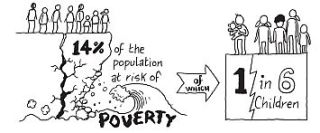Uneven impact of Covid-19 crisis will lead to increase in poverty

Life on a low income is the norm for a large proportion of our society. Prior to the current public health crisis, one in every seven people in Ireland lived with an income below the poverty line; about 680,000 people. Looking ahead, these numbers look set to rise as the very uneven impact of the Covid-19 crisis unfolds. This is one of the key findings of Poverty Focus 2020published today.
The recent Department of Finance Stability Programme Update projections for unemployment point to an optimistic scenario where unemployment remains high for the next 12-24 months. When recovery comes, it is likely that many low income workers, and employees with precarious employment conditions, will be the last to experience it. Without a concerted policy effort, many will be stuck in poverty for some time.
Poverty in Ireland: the numbers and the reality
- 14 per cent of the population, around 680,000 people are living in poverty.
- About 110,000 workers are at risk of poverty - 5.1 per cent of those who are employed.
- Approximately 200,000 children (15.9 per cent) of children are living in poverty in Ireland today - these children are living in families with incomes below the poverty line.
- Almost one in ten pensioners is living in poverty (11.4 per cent).
- Poverty levels in the Border, West and South-East regions are higher than the country as a whole. The risk of poverty in rural Ireland was 1.1 per cent higher than in urban Ireland in 2018 with at risk rates of 14.7 per cent and 13.6 per cent respectively.
- Those not employed due toillness or a disability have one of the highest poverty rates with almost one in every two (47.7 per cent) of this group with an income below the poverty line.
The crisis has highlighted the presence and challenges of the poorest in our society in so many ways. For example, the importance of low income workers to the basic functioning of our society has been given great prominence; yet many are classified as the ‘working poor’ and continually struggle to make ends meet.
Similarly, it has unexpectedly demonstrated to many households the impossible challenges of life on a low income; even when that income is set at rates well above core social welfare payments and the poverty line. If poverty rates are to fall in the years ahead, and if we are to cope with the social and economic fallout of Covid-19, we need to see an increase in social welfare payments, equity of social welfare rates, adequate payments for children, refundable tax credits, decent rates of pay for low paid workers, a universal state pension and a cost of disability payment.
Given current discussions on Government formation and programme for Government commitments, eliminating poverty should be a key priority in the programme for government. The latest figures show that we have a persistent problem with poverty which will be exacerbated by the Covid-19 crisis. As a society we must confront these new challenges, learn from past policy failures and adequately resource new strategies to successfully target and reduce poverty.
Policy Solutions
Social Justice Ireland believes that in the period ahead Government and policy-makers generally should:
- Acknowledge that Ireland has an on-going poverty problem.
- Adopt targets aimed at reducing poverty among particular vulnerable groups such as children, lone parents, jobless households and those in social rented housing.
- Examine and support viable, alternative policy options aimed at giving priority to protecting vulnerable sectors of society.
- Carry out in-depth social impact assessments prior to implementing proposed policy initiatives that impact on the income and public services that many low income households depend on. This should include the poverty-proofing of all public policy initiatives.
- Recognise the problem of the ‘working poor’. Make tax credits refundable to address the situation of households in poverty which are headed by a person with a job.
- Support the widespread adoption of the Living Wage so that low paid workers receive an adequate income and can afford a minimum, but decent, standard of living.
- Introduce a cost of disability allowance to address poverty and social exclusion of people with a disability.
- Recognise the reality of poverty among migrants and adopt policies to assist this group. In addressing this issue also replace direct provision with a fairer system that ensures adequate allowances are paid to asylum seekers.
- Accept that persistent poverty should be used as the primary indicator of poverty measurement and assist the CSO in allocating sufficient resources to collect this data.
- Move towards introducing a basic income system. No other approach has the capacity to ensure all members of society have sufficient income to live life with dignity.
- Acknowledge the failure to meet repeated policy targets on poverty reduction and commit sufficient resources to achieve credible new targets.